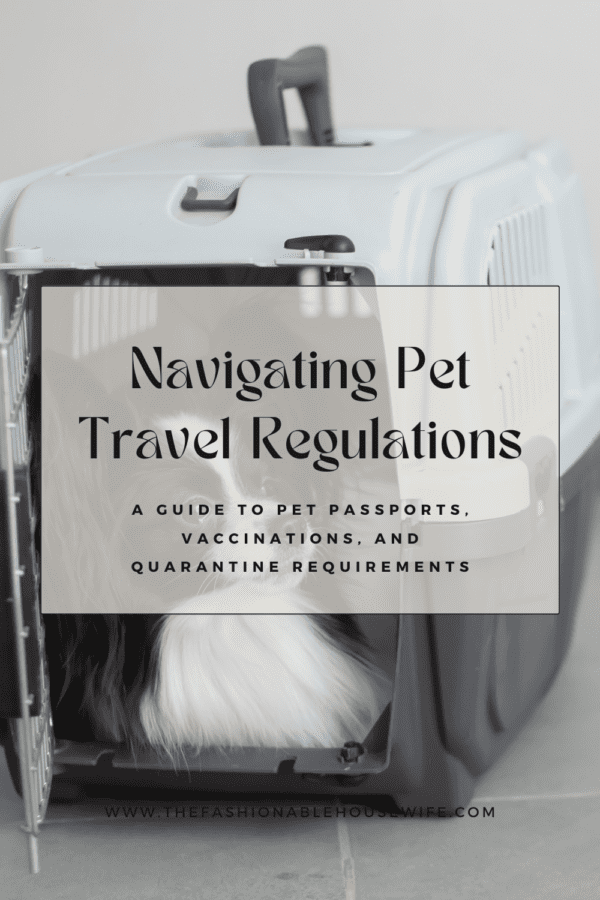
Traveling with a pet can be an exciting and rewarding experience that both you and your pet can enjoy. However, navigating the maze of pet travel regulations can be a daunting task, especially when venturing to a different country.
This guide aims to provide you with the essential information on pet passports, vaccinations, and quarantine requirements to ensure a seamless journey with your beloved pet.
Pet Passports

A pet passport is an official document that certifies your pet’s identity and medical history, allowing them to travel internationally. The passport typically contains your pet’s microchip number, vaccination records, and other pertinent health information. It’s ideal or recommended to obtain a pet passport well in advance of your intended travel date to avoid any last-minute complications.
- How to obtain a pet passport
The pet passport process varies depending on your country of residence. For example, you must visit a USDA-accredited veterinarian in the United States, who will complete the necessary paperwork and verify that your pet meets all health requirements. In the European Union, pet passports are issued by authorized veterinarians, who will ensure that your pet has a microchip and is up to date on vaccinations.
- Required documentation
When applying for a pet passport, you will need to provide several documents, including:
- Proof of ownership (e.g., a purchase receipt or adoption certificate)
- A recent photograph of your pet
- Your pet’s microchip number and implantation date
- A record of your pet’s vaccinations, including rabies (if applicable)
Vaccinations
Vaccinations ensure your pet’s health and adhere to international travel regulations. Some countries may refuse entry to pets that do not meet vaccination requirements.
- Rabies vaccination
Rabies is considered a very deadly viral disease that can affect both animals and humans. Many countries require proof of a valid rabies vaccination for pets entering their territory. Depending on the destination country, the vaccination must be administered at least 21 to 30 days before departure.
- Other vaccinations
In addition to rabies, your pet may need other vaccinations depending on the destination country’s requirements. Some common vaccinations include:
- Distemper, Hepatitis, Leptospirosis, Parvovirus, and Parainfluenza (DHLPP) for dogs
- Feline Panleukopenia, Rhinotracheitis, and Calicivirus (FVRCP) for cats
Don’t forget to consult with your veterinarian to ensure your pet receives the necessary vaccinations for your intended destination.
Quarantine Requirements
Quarantine requirements vary by country and are in place to prevent the spread of diseases among the local animal population. Researching the specific regulations for your destination country is crucial to avoid any unexpected delays or complications upon arrival.
- Pet-friendly countries
Some countries, such as those within the European Union, have relatively lenient quarantine requirements for pets arriving from other member states. Typically, pets with valid pet passports and up-to-date vaccinations can enter these countries without the need for quarantine.
- Countries with strict quarantine requirements
Certain countries, like Australia and New Zealand, have strict quarantine requirements to protect their native wildlife. Pets entering these countries may need to undergo a quarantine period of up to several months, even if they have a valid pet passport and vaccination records.
- Reducing quarantine time
In some cases, you can reduce the quarantine time for your pet by complying with additional requirements. For example, by having your pet treated for parasites and providing documentation of a negative test for specific diseases, you may be able to shorten or eliminate the quarantine period.
Tips for a Smooth Pet Travel Experience
- Plan ahead
Start researching and preparing for your pet’s travel several months in advance. This will give you ample time to obtain a pet passport, schedule vaccinations, and familiarize yourself with quarantine requirements. It’s also a good idea to book pet-friendly accommodations well in advance to ensure a comfortable stay for your furry companion.
- Schedule a pre-travel vet visit
Consult your veterinarian to discuss your travel plans and ensure your pet is in good health before embarking on the journey. Your vet can advise you on any additional vaccinations or treatments that may be necessary for your destination country and provide a health certificate, if required.
- Acclimate your pet to their travel carrier
Make sure your pet is comfortable with their travel carrier by gradually introducing them to it weeks before your trip. Encourage your pet to spend time in the carrier by placing treats, toys, and bedding inside. This will help reduce stress during travel.
- Adhere to airline regulations
Each airline has its own set of rules and regulations for traveling with pets. Familiarize yourself with these policies before booking your flight, and be prepared to comply with all requirements, such as carrier dimensions, weight limits, and documentation. Some airlines may also require a reservation for your pet, so be sure to make arrangements in advance.
- Maintain your pet’s routine
Maintaining your pet’s regular routine while traveling can help reduce stress and anxiety. Stick to their usual feeding and walking schedules as much as possible and bring along familiar items like toys, blankets, and food to make them feel more at ease in unfamiliar surroundings.
- Keep your pet’s documentation handy
Ensure you have all necessary documentation for your pet, such as their pet passport, vaccination records, and health certificate, readily available throughout your trip. This will facilitate a smooth experience when crossing borders and dealing with customs officials.
- Be mindful of local regulations
Upon arriving at your destination, familiarize yourself with local pet regulations, such as leash laws, pet-friendly areas, and any applicable breed-specific legislation. Abiding by these rules will help ensure a safe and enjoyable experience for both you and your pet.
What If You Can’t Fly There?
If flying with your pet turns out to be out of the question, embarking on a road trip adventure is a good plan to fall back on, not to mention traveling by car, RV, or camping van offers a more flexible and pet-friendly experience; allowing you to explore new places with your furry companion at your side. Whether you’re planning a cross-country expedition or a weekend getaway, don’t forget to follow these dog-friendly road trip travel tips for navigating adventures on the road with your pet.
Set Up for a Successful Trip
Traveling with a pet can be a rewarding and enriching experience, but it requires careful planning and preparation. By understanding pet passport requirements, staying up-to-date on vaccinations, and complying with quarantine regulations, you can ensure a smooth journey for both you and your furry companion. Remember to consult your veterinarian, research your destination’s pet regulations, and follow our tips for a successful pet travel experience.





